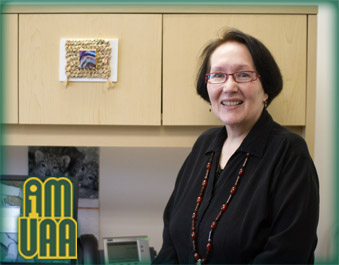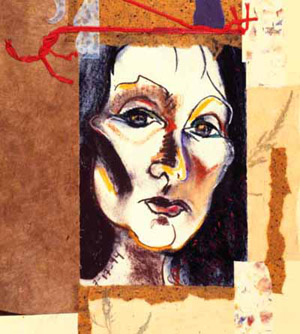I AM UAA: Phyllis Fast
by Ted Kincaid |
 Associate Professor of Anthropology and Liberal Studies
Associate Professor of Anthropology and Liberal Studies
Hometown: Anchorage, Alaska
Fun Fact: Phyllis shares that the original name of the creek running through UAA's
campus is Chanshtnu Creek, meaning "Grassy Creek" in Dena'ina-over time the pronunciation
changed to Chester Creek.
Phyllis Fast is proud of her roots and it's evident in her life's work. A Koyukon Athabascan born and raised in Anchorage, Phyllis-an artist and anthropology professor-finds it important to understand more about how her own art represents her Alaska Native heritage.
Phyllis was born in Anchorage in 1946 to an Athabascan mother, Elsie Harper Fast, who was originally from the small village of Rampart in Interior Alaska. Growing up, Phyllis was a good student but she didn't have a lot of direction and admits to battling many cultural stereotypes.
When Phyllis graduated from high school after the 1964 earthquake, there was only one University of Alaska campus, in Fairbanks. While she was accepted into two colleges in Washington, Fairbanks was the best choice since her grandmother and other relatives lived there.
She earned a B.A. in English from University of Alaska Fairbanks (UAF) in 1968, but it wasn't until she arrived at UAA 17 years later that she felt like she truly found herself. During her first semester she enrolled in an anthropology class taught by Department of Anthropology Chair Dr. Steve Langdon, which "woke up something in me," Phyllis says.
As Phyllis started her classes at UAA, her mother's health was deteriorating quickly. To help cope with her mother's illness, Phyllis started taking art classes through UAA's Department of Art. "There's something very recuperative about art," she says. "I seriously encourage anyone going through a difficult time to do something nonverbal-you'll find out some interesting things about yourself. Art is very personal and it's a great way to communicate your feelings."
Phyllis's mother eventually passed away in 1982. "It felt like her death cut off my only source of knowing what it meant to be Athabascan," she says. "I knew it was time to embrace my own identity."
With the help of her advisors, Phyllis was able to create a hybrid master's degree, combining courses in anthropology, art and English. She earned an M.A. in Interdisciplinary Studies in 1990 at the age of 44.
It didn't take long for Dr. Langdon to try and talk Phyllis into pursuing her doctorate degree. "I laughed, really," she says. "Here I was, 44 years old, thinking it was the end of the world-I didn't have any reason to go after a Ph.D."
Reluctantly, Phyllis applied to a handful of doctoral programs in anthropology. And what do you know? She was accepted into four schools, one of them being Harvard University. "I was stunned."
Upon arriving in Cambridge to start her doctoral coursework, Phyllis says she felt out of sync with the universe and the rest of her new Ivy League home. "I was a middle-aged woman sitting next to 20-somethings, but oddly enough, it worked." Though she felt out of place at first, Phyllis found solace at Harvard's Reed House, a gathering place for Native American students. "I learned so much about Indian identity in general, what it feels like to be a Native person and, for once, not to be ashamed of it," she says.
Phyllis was 52 when she earned her Ph.D. in Social Anthropology from Harvard University and her plan all along was to return to Alaska after completing her doctoral studies. She landed a teaching job at UAF in Alaska Native Studies, where she stayed until an opportunity became available at UAA in Anchorage in 2004. "I felt like the cosmic forces had come together, telling me it was time to go home."
An associate professor of anthropology and liberal studies, Phyllis enjoys sharing the cultural and artistic elements of Alaska's diverse Native cultures with her students. She has the pleasure of working with many of the same faculty that were her professors during her time as a student. "They hatched me, even though I'm older than them," she says, smiling. "UAA is where I found myself."
 Her research interests revolve around indigenous identity among Alaska Natives. She
is the author of Northern Athabascan Survival: Women, Community and the Future. This
year she is on sabbatical and is busy co-writing a textbook, Alaska's First Peoples,
with her colleague Professor Kerry Feldman, Ph.D.
Her research interests revolve around indigenous identity among Alaska Natives. She
is the author of Northern Athabascan Survival: Women, Community and the Future. This
year she is on sabbatical and is busy co-writing a textbook, Alaska's First Peoples,
with her colleague Professor Kerry Feldman, Ph.D.
When she's not teaching, researching or writing Phyllis fills her time as an artist using a variety of mediums, ranging from fiber art to painting and illustration. Her artwork has been featured in many exhibits across Alaska and in 2007 she was awarded the Alaska Native Arts Foundation Cultural Arts Project Support (CAPS) Initiative grant. Take one look at Phyllis's work and it's evident that she's proud of her Athabascan heritage.
 "I AM UAA: Phyllis Fast" is licensed under a Creative Commons Attribution-NonCommercial 4.0 International License.
"I AM UAA: Phyllis Fast" is licensed under a Creative Commons Attribution-NonCommercial 4.0 International License.









